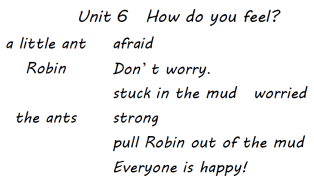人教pep六上英语 Unit 6 The fifth period第五课时教案
The fifth period(第五课时)
Part B Read and write
![]()
▶教学内容与目标
课时教学内容 | 课时教学目标 |
Read and write | ·能够通过绘制表情图复习表示情绪的单词 ·能够在语篇中捕捉不同类型的信息,提炼出文章的主旨大意,完成排序题 ·能够根据阅读所获取的信息完成故事缩写活动并能口头复述 ·能够根据例句提示在文段中找到更多同类现象,能够正确朗读句子和语篇 ·在活动中渗透让学生不要以貌取人,明白团结的力量,以及应当乐于助人的道理 |
▶教学重点
能够根据阅读所获取的信息完成相应的阅读任务。
▶教学难点
能够在语篇中捕捉不同类型的信息,提炼出文章的主旨大意。
▶教学准备
PPT课件、课文录音等。
 ▶教学过程
▶教学过程
1
Step 1: Pre-reading
1. Greetings.
2. Sing a song.
Play a song If you’re happy, clap your hands on the PPT.(出示课件)
Students sing along with it.
3. Look and say.
(1)Show some pictures on the PPT.(课件出示:带有不同情绪的人物图片)Let students look at the pictures.
(2)Talk about the pictures.

Talk about one picture with a student to make a demonstration.
T: How does she feel?
S1: She is angry.
T: What should she do?
S1: She should take a deep breath and count to ten.
Students talk about the pictures with their partner.
4. Draw faces for each word.
T: Now please open your English book and turn to page 62. Look at this part. Can you read these words?
Students read the words together.
Ss: Afraid, happy, angry, sad.
Students draw faces for each word by themselves.
 Step 2: While-reading
Step 2: While-reading
1. Look and predict.
Show the picture to students. (课件出示:教材P62 Read and write板块的图片) Let students look at the picture carefully. Ask some questions to lead them to predict the main idea of the story.
 Questions: ①Who are they? (Point to the ant and write down the word “ant” on the blackboard. Help students to spell the word.)/ ②What will happen between Robin and the ant? Can you guess?/ ③How do they feel?/…
Questions: ①Who are they? (Point to the ant and write down the word “ant” on the blackboard. Help students to spell the word.)/ ②What will happen between Robin and the ant? Can you guess?/ ③How do they feel?/…
2. Fast reading.
Ask students to read the story for the first time quickly and try to finish the first task.

Then check the answer.
 Help students understand the main idea of the story.
Help students understand the main idea of the story.
3. Careful reading.
Ask students to read the story for the second time carefully and try to number the pictures and underline the corresponding sentences.
Then check the answers.
Talk about the story with students to help them understand the story.
T: Robin is going to sit on the grass.
Use the picture to help students to understand “sit on” and “grass”. (课件出示:Robin坐在草地上的图片)
T: He hears, “Wait!” (Use the action to help students understand.) Whom does Robin find?
Ss: A little ant.
T: How does the ant feel?
Ss: He is afraid.
T: What does Robin say? (Lead students to answer.)
Ss: Don’t worry.
Help students to understand the word “worry” through the word “worried”.
T: The next day, it is raining. What’s wrong with Robin?
T: Oh! He’s stuck in the mud.
Show the picture to students. (课件出示:Robin陷在泥里的图片) Help them understand the phrase “stuck in the mud”. Teach the phrase.
T: Who helps Robin then?
Ss: The ant and his friends.
T: How do they help Robin? (Lead students to answer.)
Ss: They pull Robin out of the mud.
Use the action to help students understand the word “pull”.
T: What do you think of the ant?
Ss: It’s small. But they are strong.
T: Cool! Unity is strength. How do they feel?
Ss: They feel happy.
T: Why? (Lead students to answer.)
Ss: Because they help each other.
 T: Yes! Everyone needs help. We should help others when they are in trouble.
T: Yes! Everyone needs help. We should help others when they are in trouble.
Help students understand the word “everyone”. Teach the word.
4. Read after the recording.
Play the recording.(课件出示:教材P62 Read and write板块的音频)
Students read after it. Imitate the right pause. Pay attention to the pronunciation and the intonation.
 5. Fill in the blanks and retell the story.
5. Fill in the blanks and retell the story.
(1) Fill in the blanks.
Students fill in the blanks by themselves.
Then talk about them in groups.
Check the answers.
Answers: afraid; worried; pull Robin out of the mud; is happy
(2) Retell the story.
Students try to retell the story according to the sentences and the pictures.
Ask several students to retell the story to the class.
 Step 3: Post-reading
Step 3: Post-reading
1. Read a passage about pets and fill in the chart.
Show a passage about pets and the chart on the PPT. (课件出示:阅读材料及其表格)
Students read the passage and try to fill in the chart.
Check the answers.
2. “Tips for pronunciation”.
 (1)Listen and repeat.
(1)Listen and repeat.
Play the recording.(课件出示:教材P63 Tips for pronunciation的音频)
Students read after the recording and feel the phenomenon of loss of plosion between the words.
Practice the phrases.
T: 当一个爆破音跟另一个爆破音相遇时往往失去爆破。爆破音(即/b/ /p/ /d/ /t/ /g/ /k/)中的任意两个相邻时,第一个爆破音只形成阻碍,但失去爆破,稍停顿一下,快速向第二个完全爆破的爆破音滑去。
(2)Find and practice.
Find more similar phrases in the story on page 62 according to the examples, and read them correctly.
Practice in groups.
(3)Show time.
Ask several students to show to the class. The other students listen to them and make evaluations.
1
▶板书设计

▶作业设计
Choose some more phrases and practice them.
▶教学反思
1.引导学生通过PPT出示的图片复习相关内容,帮助学生激活背景知识和储备词汇,动脑、动手为下面进入阅读做准备,充分激发学生的学习兴趣。
2.引导学生通过任务在语篇中捕捉不同类型的信息,提炼出文章的主旨大意,完成排序题。并就故事与学生展开对话,借助动作、图片等帮助学生理解故事。
3.在学习过程中渗透让学生不要以貌取人,明白团结的力量,以及应当乐于助人的道理。
![]()
▶Teaching Contents & Teaching Aims
Read and write
·Be able to review the emotional words by drawing pictures of expressions.
·Be able to train students’ reading ability to capture different types of information and extract the main idea of the story through the reading tasks.
·Be able to abbreviate the story and retell it orally.
·Be able to find more similar phrases in the story according to the examples and read them correctly.
·Be able to conduct moral and emotional education in activities. Help students know that“Don’t judge a person by his appearance.”, understand“the strength of unity”and know the truth of “be willing to help others”.
▶Teaching Priorities
·Be able to complete the corresponding reading tasks.
▶Teaching Difficulties
·Be able to capture different types of information in the story and extract the main idea of the text.
▶Teaching Procedures
Teaching Stages | Teacher’ s Activities | Students Activities | Teaching Purposes |
Pre-reading | 1. Greetings. 2. Sing a song. Play a song If you’re happy, clap your hands by using the PPT. 3. Look and say. (1)Show some pictures on the PPT. (2)Talk about the pictures. (3)Talk about one picture with a student to make a demonstration. 4. Draw faces for each word. | 1. Greetings. 2. Sing along with the recording. 3.(1)Look at the pictures. (2)Talk about the pictures with partners. 4. Read the words together. Then draw faces for each word on page 62. | Activate students’ background knowledge and reserved vocabulary through pictures. Stimulate students’ interest in learning. Prepare for the following reading. |
(续表)
Teaching Stages | Teacher’ s Activities | Students’ Activities | Teaching Purposes |
While-reading | 1. Look and predict. Show the picture to students. Ask some questions to lead students to predict the main idea of the story. Point to the ant and help students to spell the word. | Look at the picture carefully. Answer the questions and predict the main idea of the story. Try to spell the word “ant”. | Use the questions and the picture to lead students to predict the main idea of the story. Cultivate students’ observation ability and logical reasoning ability. |
2. Fast reading. Ask students to read the story for the first time quickly and try to finish the first task. Check the answer. Help students understand the main idea of the story. | Read the story for the first time quickly. Try to finish the first task. Check the answer. Understand the main idea of the story. | Help students to understand the requirements of the questions. Lead them to read the story quickly and extract the main idea of the story. | |
3. Careful reading. Ask students to read the story for the second time carefully and try to number the pictures and underline the corresponding sentences. Then check the answers. Talk about the story with students to help them understand the story. Teach the new words and phrases. | Read the story for the second time carefully. Try to number the pictures and underline the corresponding sentences. Check the answers. Then talk about the story with the teacher. Try to understand the story. Learn the new words and phrases. | Capture different types of information and extract the main idea of the story through the reading tasks. Conduct moral and emotional education in activities. | |
4. Read after the recording. Play the recording. | Read the story after the recording. Imitate the right pause. Pay attention to the pronunciation and the intonation. | Make sure students are able to read the story correctly and fluently. | |
5. Fill in the blanks and retell the story. (1) Check the answers. (2) Retell the story. | (1) Fill in the blanks. Then talk about them in groups. Check the answers. (2) Try to retell the story according to the sentences and the pictures. Retell to the class. | Help students abbreviate the story and retell it orally. | |
Post-reading | 1. Read a passage about pets and fill in the chart. Show a passage about pets and the chart on the PPT. Ask students to fill in the chart. Check the answers. | Read the passage and try to fill in the chart. Check the answers. | Cultivate students’ reading interest and ability. |
2. “Tips for pronunciation”. (1)Listen and repeat. Play the recording. Ask students to read after the recording and feel the phenomenon of loss of plosion between the words. Ask students to practice the phrases. (2)Find and practice. Ask students to find more similar phrases in the story according to the examples, and read them correctly. Ask students to practice in groups. (3)Show time. | (1)Read after the recording. Feel the phenomenon of loss of plosion between the words. Practice the phrases. (2)Find more similar phrases in the story according to the examples, and read them correctly. Practice in groups. (3)Several students show to the class. The other students listen to them and make evaluations. | Help students feel the phenomenon of loss of plosion between the words. Encourage students to find more similar phrases and read them correctly. Improve students’ self confidence in learning by showing to the class. | |
Homework | 1. Choose some more phrases and practice them. 2. Do the exercises. | ||
1
